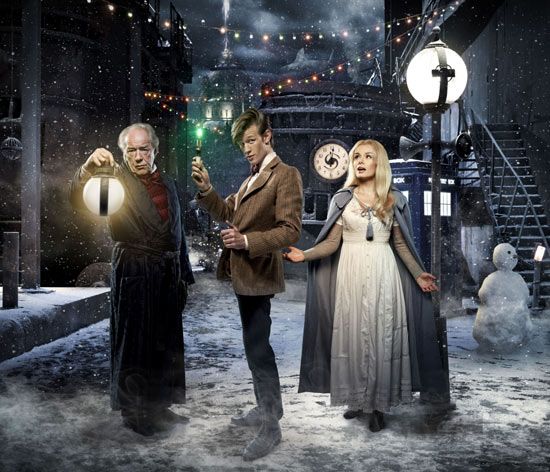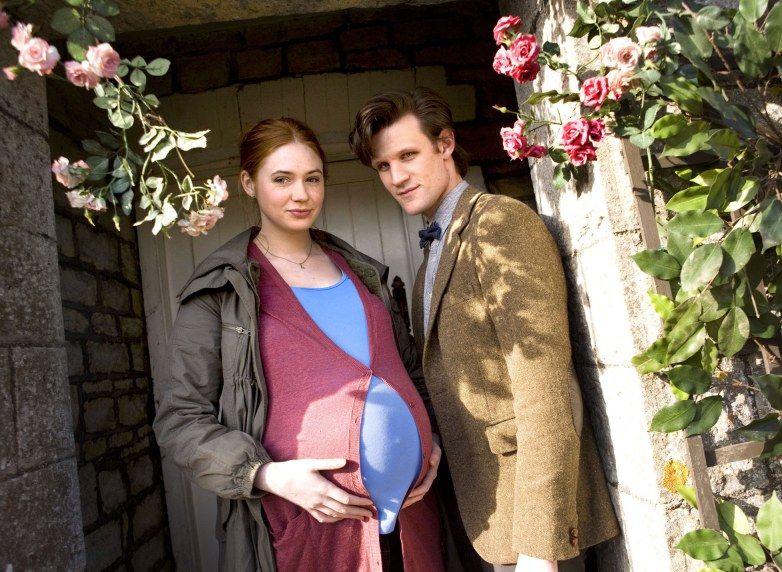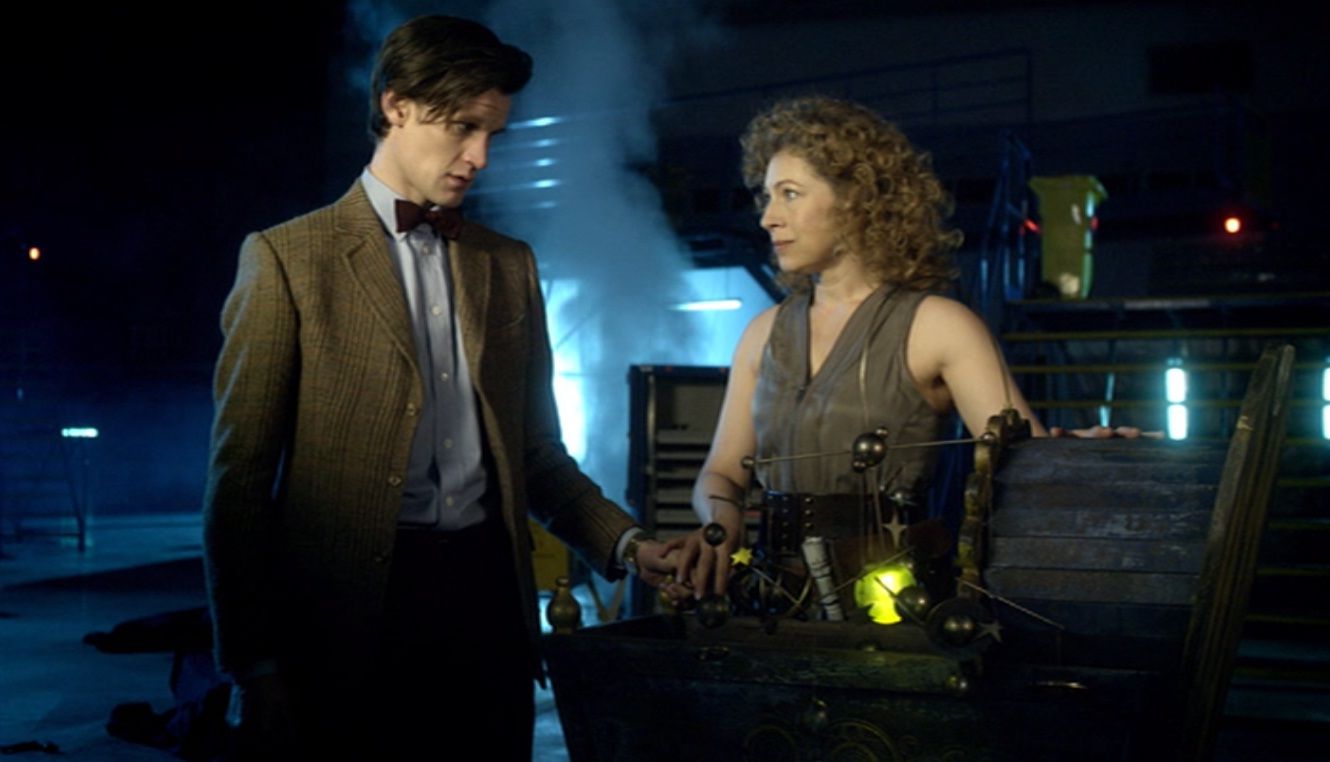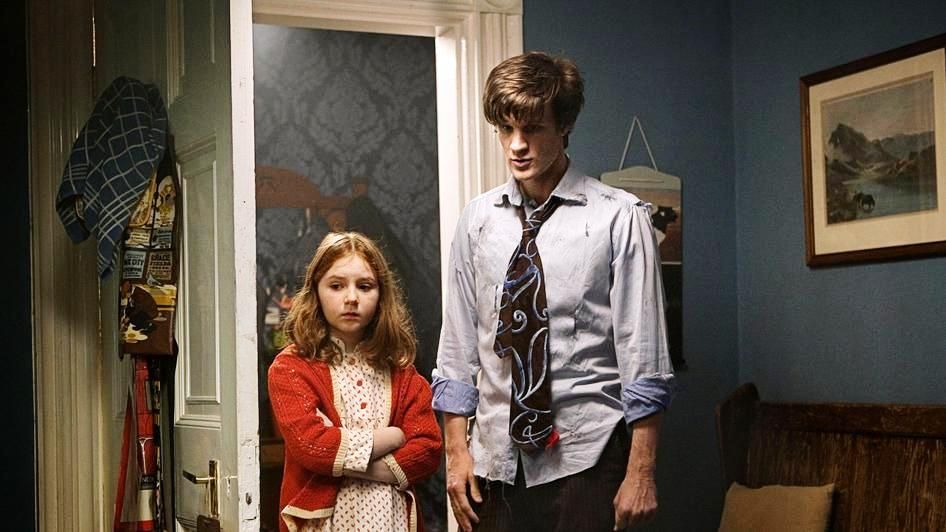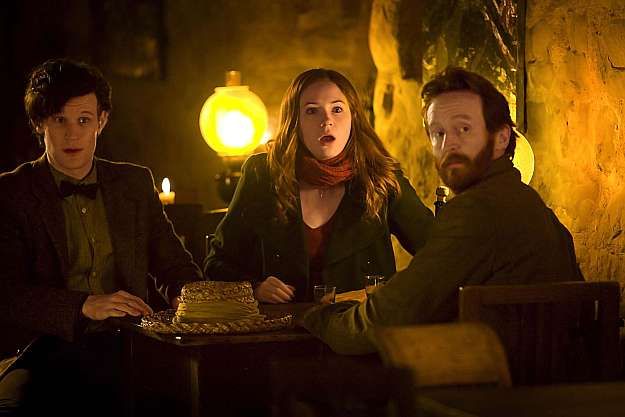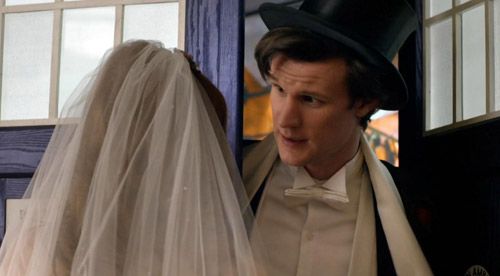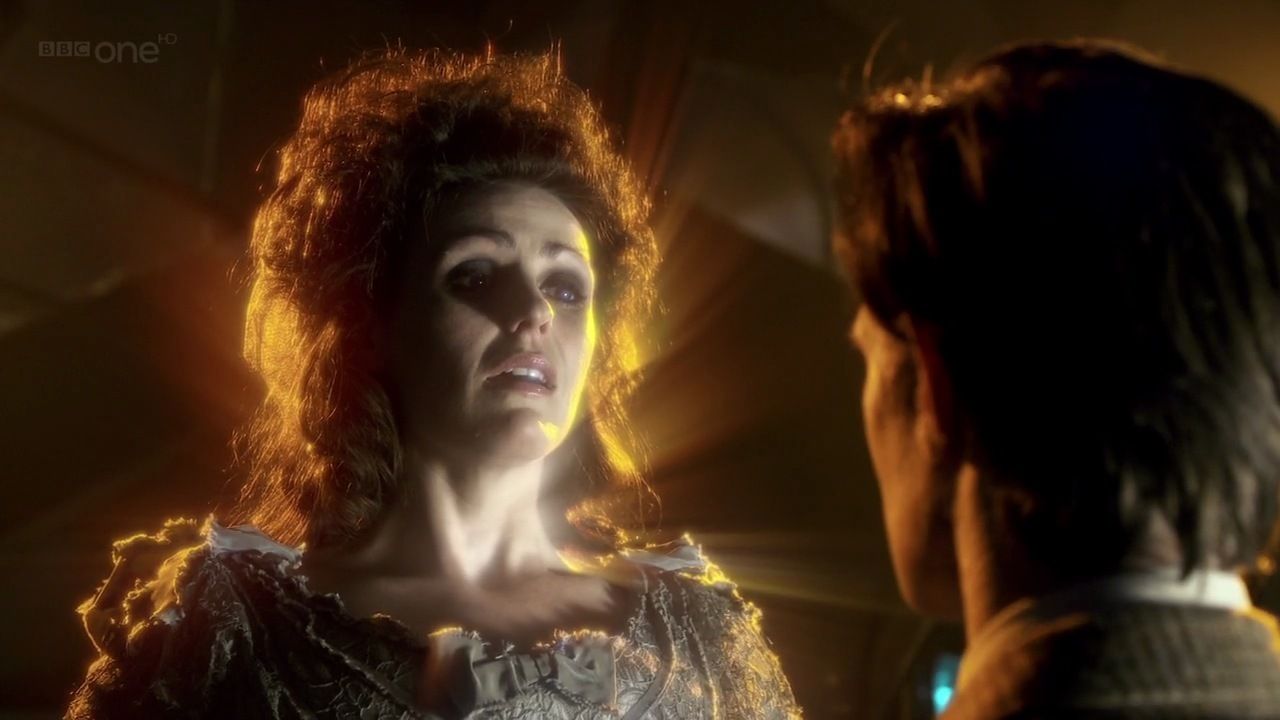Following the departure of fan-favorite actor David Tennant as the Tenth Doctor, expectations were high for the fresh-faced Matt Smith, who took on the Eleventh incarnation of the enduring role. As his third year – and the seventh season of “New Who” -- gets under way, Spinoff Online looks back on 11 of the best, and seven of the weaker, episodes of the Smith Era.
11. Season 6, Episode 13: "The Wedding of River Song,” written by Steven Moffat
The Season 6 finale proved one of the most divisive in the show's recent history, sparking a lot of complaints that it was anticlimactic. While the story was more fractured than anticipated and the titular nuptials certainly were a bit flat, it was a triumph overall. A lot of disappointment stemmed from what many perceived as a cop-out in the resolution to the season arc, which dealt primarily with the killing of the Doctor at “a fixed point in time” and his attempts to circumvent that fate.
When a story is set up in this fashion, some awkward narrative maneuvering inevitably comes into play. While many viewers hoped a writer as shrewd as Moffat would have something truly spectacular up his sleeve, I found the employment of the Teselecta both satisfying and logical. In fact, rarely does Who act so straightforward and tech-heavy -- it usually relies on last-minute reverses and technological deus ex machina. The Doctor-Donna of “Journey’s End” is a far more convenient out than "The Wedding of River Song."
While the overall arc suffered its own problems and huge holes in logic, the use of a Doctor inside a Doctor suit is fine by me. It baffles me that people had more of a problem with this concept than with the previous season's far more wishy-washy conclusion of Amy "magically" conjuring the Doctor back into existence by the sheer power of memory.
Elsewhere, the episode provides an endless array of delights: Churchill mentioning downloads, the Silence mocking Rory as the man who always dies, Amy getting in touch with her inner Nick Fury while rocking an eye patch and cruelly punishing the smug Madam Kovarian for kidnapping her daughter, and in a truly beautiful scene, a poignant tribute to a fallen character. Masterfully woven into the story is the Doctor facing inevitable mortality through the death of Brigadier Lethbridge-Stewart. This moment crystalizes that time eventually does catch up with us all, and as a nod to the sad passing of Brig-actor Nicholas Courtney. It's a heartbreaking moment for longtime fans. This scene alone would make this episode a worthy addition to any list. One must wonder if sweet Sarah Jane actress Elisabeth Sladen will be similarly honored this season.
10. 2010 Christmas Special: "A Christmas Carol,” written by Steven Moffat
Christmas Specials invariably get a pass given the schmaltz of the season. As episodes, they can go either way, embracing straight-up festive fun or smothering with seasonal excess. For the most part, Moffat's first Christmas special as showrunner succeeds in being exactly what it needs to be: a heart-warming, if tragic, paean to the power of friendship and love, and how at Christmas, the emotional spectrum is amplified for better or worse.
Based on the overused Dickens classic that has provided the template for countless interpretations, the show is canny with its approach as the Doctor admits he is pilfering the main beats of the story in his quest to turn a nasty man nice on Christmas Eve. The man in question, Kazran Sardick (played by a peerless Michael Gambon), is an influential figure who has a machine that can save Rory and Amy as their spaceship flies out of control and falls toward the planet.
The threat of the plummeting ship becomes almost incidental as the Amy and Rory recede into the background. Instead, the episode becomes an exploration of the malleability of identity through memory and experience, combined with the effect old wounds can have on people through their whole lives. Time-travel rules, always flimsy within the series, go out the window as the Doctor actively and -- it must be said -- quite selfishly, meddles in Kazran's youth for his own benefit. It's something the Doctor is never really called on. Although he acts altruistically and Kazran is a horrible sort who should be reformed, it still strikes a curious note as to how reckless the Time Lord can be. However, the episode has such warmth and humanity that it transcends the plot mechanics. The Doctor interacting with a young Kazran gives us some wonderful lines as again we see him develop a rapport with a child character, allowing Smith to play up the fun and anarchic elements of the role. His advice on kissing to a teenage Kazran is one of the gentlest pieces of humor ever seen on the show and is quite possibly my favorite Smith scene. His wry smile as he walks away from the nervous Kazran is a magical moment.
As a whole, "A Christmas Carol" allows Moffat to pluck our heartstrings in a way his stories rarely do. I'm a huge fan of his work, but it's no secret it can come across as quite cerebral, and the people within the story can suffer because of this -- not the case at all in this episode, as it is almost willfully character-based. Admittedly, it's a convenient conceit that the shark is soothed by guest star Katherine Jenkins' singing voice, but for the spectacle and heart the setup provides, I'd overlook such plotting lapses and enjoy the shark-pulled sleigh ride. My favorite Christmas special of the show's modern era, and with the Eleventh Doctor flitting between mischievous and melancholic, a great showcase for Smith.
9. Season 5, Episode 7: "Amy's Choice,” written by Simon Nye
An underrated gem, this is the episode that finally got me on Amy Pond's side. The character had serious growing pains in her first season; the sassiness ramped up to irritating levels and her often casual dismissal of Rory made her quite unsympathetic. Using a simple device of two dangerous scenarios -- one set years in the future with the Doctor and a domestic Rory and Amy battling aliens disguised as pensioners and the other seeing the TARDIS on a collision course with a frozen dying star -- the episode revolves around the debate of which dire threat is real and which is a dream. This choice is offered to them by the wonderfully villainous creation that is the Dream Lord, played with real relish by guest star Toby Jones. He crafts a deliciously sardonic, spiteful sprite whose malicious swipes at our heroes hint at many home truths within the dysfunctional group, and his scenes give the episode a real verve.
It's no secret that as good as Who is right now, it's lacking in truly memorable villainy. Moffat's use of gimmicks has given viewers some fantastic creations, but the Weeping Angels and the Silence are almost narratively bound by their concepts to breathe creatively. Madame Kovarian was a cipher of sorts, as her motivations remain frustratingly vague. It may be a case of Russell T Davies borrowing all the best toys during his run, but it's a shame we haven't been given a new bad guy who can revel in wickedness the way the Master or Davros could. The Dream Lord is the closest viewers get to that style of evil. While a poor cop-out at episode's end cancels out his role somewhat, it doesn't derail what is at heart a fabulous character. One can only hope the Dream Lord returns in some form.
While Jones steals the scenes he’s in, the rest of the cast brings its A game. In particular, Karen Gillan impresses when it appears that Rory has perished -- her devastation and emotional shutdown finally giving a glimpse of vulnerability and allowed viewers to care for her. It’s my favorite performance of the uneven first year for the character, and all in a tidy, done-in-one episode. Using bird song as a creepy signifier of dreams is another one of those wonderful Whovian devices, and a sign that writer Simon Nye is at home with the house style of the show. Marks taken off for Rory's awful ponytail, though!
8. Season 5, Episode 5: "Flesh and Stone,” written by Steven Moffat
"Blink" will remain an evergreen classic of modern Who. Moffat's pitch-perfect introduction to one of his finest creations in the Weeping Angels was so well received, it was only a matter of time before a sequel would emerge, and the two-part "Time of Angels/Flesh and Stone" provided an adrenaline-fueled follow-up to its far more sedate predecessor. Also using the chance to flesh out (no pun intended) returning guest star Alex Kingston as River Song, this was a story with a lot of elements at play. "Flesh and Stone," the second half of the two-parter, becomes a chase caper replete with breathless asides and comfy chairs. It has Smith in full-on heroic form, spinning around the more dangerous elements like a kid trying to stay out of trouble, improvising his way from one moment to the next.
"A forest in a bottle on a spaceship in a maze. Have I impressed you yet, Amy Pond?" quips the Doctor. That question perfectly sums up the burgeoning relationship between the Doctor and his latest companion. It also gives insight into the personality of the Eleventh: He's a cosmic show-off, desperate to be cool and hip, yet a man who is literally and stylistically very much out of time. When it comes to Amy, he really wants to connect with her out of guilt for abandoning her and for the huge impact he's had across her entire life.
That reckless quality to the Doctor makes the episode great fun but also throws up a few quibbles. Season 5 had an overarching theme concerning cracks in time erasing people from history, which becomes very pronounced in this story, effectively offering a way out of the predicament. It's not the most satisfying ending, as it feels very much like convenient plotting. Also, the Angels move in a scene where Amy attempts to deceive them. While a lot of viewers liked this moment and found it effective, I have to admit I always loved the idea that the audience is complicit in the conceit involving the Angels. They don't move when anybody sees them -- including the audience, which makes them unique. The Angels themselves are a triumph of design, but remove their special status and it can only devalue the whole concept.
The episode ends on a bit of a cheeky note. Amy hits on the Doctor in a coda that does feel tonally off for the show, but being a fan of Gillan, I accept the rather flimsy context provided. It has been excused away in fandom that she was acting on years of pent-up attraction for the Doctor manifesting itself in a reaction against almost being killed by the Angels. No matter the opinion, the scene does still feel more like fare from one of Moffat's more adult sitcoms. However, it's a fine, fun ending to a great two-parter and just the momentum needed to propel viewers into the next episode, the rather ordinary "Vampires of Venice."
7. Season 6, Episode 8: "Let's Kill Hitler,” written by Steven Moffat
Another divisive installment that came in for a lot of flak for its use -- some would say under-use -- of Hitler and its time period. I was so happy with that development. How many times have Nazis been used to make points in science fiction? It's an exhausted idea that dates back to classic Star Trek (Voyager and Enterprise also did variations on World War II environments). To be honest, I'm sick of seeing it employed. When it became clear this would be an episode to tie into the River Song arc, it was a surprise and welcome breath of fresh air from what could have been a stale set up.
Hitler is dismissed with swift ease and removed from the story in a casual manner, but so what? The regeneration of River Song into an evil brainwashed incarnation gives viewers plenty of juicy moments. The scene in which she and the Doctor attempt to outdo each other in cleverness and preparation interspersed with silly flashbacks is an ingenious scene that Moffat may have used before (in his Comic Relief special) and pilfered from Bill and Ted, but it doesn't take away from the sheer fun. The setting also gives River an interesting playground to act out maniacally and makes the episode visually stunning. After a summer away, this episode was an unexpected thrill ride -- but that would be all for naught if the climax didn't prove so important to the overall mythology.
There's no denying the Doctor's dying scene is a tad drawn out, but that allows Smith to portray a Doctor completely out of control. His interactions with the TARDIS mainframe, wittily brought to life with holographic representations of past companions brings a look into the Doctor's self-loathing and the final sacrifice River makes to save him does wonders for her character development. Here's the true beginning of her journey to become one of the most important people in his life. The fact that it was done in such an unexpected enjoyable fashion gives us that rare thing in ongoing sci-fi storytelling, the arc episode that is as breezy as a standalone.
Plus, Rory punches Hitler. How can someone be so churlish as to not cheer for that?
6. Season 6-, Episode 7: "A Good Man Goes to War,” written by Steven Moffat
What I adore about this episode is that it feels like an old-fashioned comic book team-up in which a threat is so large, different factions must come together, each bringing its own unique gifts to solve a dilemma. We've seen it most recently writ large in Joss Whedon's The Avengers, but the artistry of this tale is that -- with a few minor exceptions -- viewers hadn't seen any of these characters before. The lack of backstory didn't stop them becoming fan favorites shortly after this episode aired.
In fact, there seemed to be a near-unanimous call from fandom for a spinoff featuring the Silurian Madame Vastra and her sidekick Jenny -- a pretty amazing reaction, considering this is their only appearance so far. There's also the Sontaran nurse who combines a maternal instinct with the usual steely militant demeanor of his race, and an expanded role for the Dorium character that would be rounded off nicely later in the series. In fact, the episode jumps around so many eras and tones, it's amazing it hangs together so well and gives us the whole spectrum of the current Doctor. We see his heroism, his cockiness, flashes of a dark and angrier side, and also the influence he's had across time and space -- for better and for worse. He assembles a team of those indebted to him to storm a stronghold called Demon's Run to rescue Amy and her new child. In a rare occurrence and classic piece of misdirection, the Doctor is actually outsmarted.
Beginning the episode by assembling disparate allies and keeping the Doctor sidelined is a masterstroke, as it allows his legend to grow. It's rare that the audience can still be thrilled by a character seen all the time -- but the Doctor's first appearance, posing as one of the creepy Headless Monks (another bizarre Moffatian take on religion) is a delight and a testament to the skill of the writing that the re-introduction gives viewers a big heart-swelling scene.
A watershed moment in Moffat's tenure is the River reveal. It was signaled as soon as we learned the name of Amy's child, but the actual scene is still spine-tingling. The chemistry between Smith and Kingston is immaculate, and it ends the episode on an oddly upbeat note considering how bleak everything threatened to get. An episode that added to, and deconstructed, the Time Lord as an angry God-type figure, introduced a plethora of sublime new creations while not forgetting to tell a cracking good story.
5. Season 6-, Episode 10: "The Girl Who Waited," written by Tom MacRae
An elegant and cleverly written standalone story that almost stole the show when it came to Season 6, "The Girl Who Waited" felt like a Moffat episode in the Russell T Davies era: a tight narrative delight that combines complexity and accessibility. It's Tom MacRae's best contribution to the series.
In the past, the "Doctor Lite" episodes have been obvious in their sidelining of the hero, but this is subtle. The story focuses on an Amy trapped for decades in a medical center in her own time bubble cut off from the Doctor and Rory. When they catch up with her they find a cold and embittered woman, betrayed by the man she has put so much trust in since she was a little girl. Her anger toward the Doctor is chilling in its sincerity and is a clever inversion of the perennial Doctor/Amy dynamic. She will always be, in some ways, the little girl waiting for her magic Doctor to make things right. Gillan, in an excellent double-hander as the jaded older Amy and her usual role as plucky companion, gives her finest performance to date with an all-too-believable sense of bitterness and disappointment contrasted with the still relatively innocent woman by the Doctor's side. Rory emerges as the true hero willing to take risks to try and save two aspects of a woman he loves more than anything. The final inevitable twist to the tale is as heartbreaking.
Elsewhere, the episode is served by a fantastic set design, minimalist but still impressive with gorgeous sci-fi vistas set against a cold medical environment that brings to mind the setting of a harder science fiction world such as "THX 1138." It also gives viewers some satire on the perils of bureaucracy and medical care run amok to an absurd degree. "The Girl Who Waited" is criminally underrated as an episode. Had it aired in a year sans Gaiman, I would be hard-pressed to think of a finer Season 6 outing. How can one not be charmed by the fact that the Macarena becomes an important plot point in the correcting of time and in the salvation of a person?
4. Season 5, Episode 1: "The Eleventh Hour,” written by Steven Moffat
This episode had a lot riding on it: It was the opening gambit, the episode that needed to establish a new team both behind and in front of the camera. It also had to soothe those still licking their wounds from David Tennant's departure and introduce the youngest actor to ever play the part.
Within 10 seconds of his encounter with a young Amy, Smith nails it with a curious mix of hyperactivity and gravitas. His scenes trying various Earth cuisines before settling on the unconventional and, at this stage, iconic mix of Fish Fingers and Custard are a distillation of the Eleventh Doctor. He'll muck around with conventions while sweeping you along for the ride, and it's no wonder the young girl who meets him builds a great portion of her life around him. Wouldn't we have all cherished the friendship of this eccentric when we were children? The Eleventh Doctor is the ultimate imaginary friend, and in this episode he is in flying form. However, he is put upon by circumstance. A creature has escaped through a crack in the wall and an alien ship stands poised to destroy Earth if the escaped Prisoner is not returned to its warden within 20 minutes.
So begins an exuberant caper where the Doctor, without his sonic screwdriver or TARDIS, struggles to resolve the issue, inspiring folk on his way and cementing an indelible bond with Amy Pond. There are a few problems: The other denizens of Amy's village are underdeveloped and seem rather throwaway; the Doctor's faith in pointless character Jeff seems like a holdover from the last series; and Rory barely gets a look in. However, this is all minor stuff. Where this episode succeeds is in the conjuring of its new protagonist and in the establishing of the fairytale vibe Moffat wanted to instill the series with. The production values have also gone up a bit, as the show has never looked crisper or more confident. Moffat said something along the lines of using humor to sell the Eleventh Doctor to the audience, and he doesn't disappoint. This episode is chock full of great lines and flourishes, not least the stirring sequence where the Doctor decides on his new look in the shadow of all his previous incarnations while facing down a looming alien threat. There is a line near the episode’s end where Amy bemoans the situation of traveling with the Doctor, using the flat and thoroughly mundane objection that she "grew up." "Don't worry," the Doctor quips, "I'll soon fix that." That was when it was sealed for me. We were in good hands.
3. Season 5, Episode 10: "Vincent and the Doctor,” written by Richard Curtis
Built around a strong and uncompromising look at depression, "Vincent and the Doctor" written by famed Hollywood screenwriter Richard Curtis, is an odd beast. Basically a character study of Vincent Van Gogh. What makes this such a powerful piece is that it isn't afraid to show the truly hopeless side of sadness -- rare for a children's program. Usually depression is sanitized, but one scene here is particularly dreary and shows that even with 900-plus years of experience there are certain demons even the Doctor can't vanquish.
The tale is offset by some nice touches: the cheeky flirting between Van Gogh and Amy; a scene of her among sunflowers that may be an aesthetic high point for the series; and an emotionally charged ending that may test the mettle of the more cynical minds. But at its heart this is rough stuff. The monster of the week is the only bum note, an invisible peril a little too abstract to really engage viewers. However, the monster isn't the point of the story. It is almost sci-fi window dressing, an adherence to the formula while the character material veers interestingly out of the norm. Tony Curran, despite being an obvious Scottish actor, imbues the tortured artist with a dry, earthy demeanor that fully gets the audience on his side. Playing a real-life figure can be daunting, but any apparent bending of the persona works here, and his shift from sadness to euphoria in the aforementioned climax is a well-earned moment. Bill Nighy pops up, and while hardly stretching his talents with a bumbling, eternally British exterior, his cameo only enhances the whole affair and gives the episode an extra kick. A work of art in its own right, and tonally it adds a new hue to the palette of Who.
2. Season 5, Episode 13: "The Big Bang,” written by Steven Moffat
After the rather doomy penultimate episode of Smith's first year, "The Pandorica Opens," viewers were spoiled with a pleasingly manic and complex conclusion with "The Big Bang" a full-to-the-brim excursion that had a Dalek, a fez and a reboot of the entire universe. It’ a lot to cram into just under an hour, and the story is riddled with plot holes hastily written over.
However, it doesn't matter when the show is this infectious. The tone jumps from the surprisingly fun and lighthearted beginning, darkening as the story develops, only to come back full circle and give us a cheerful finish with the wedding of Mr. and Mrs. Pond. Also the Doctor dances -- this time it’s not a euphemism -- and it's brilliantly cringe-worthy. All hail Smith's total lack of vanity. He'd probably just say, "Bad flailing around is cool."
What's wonderful is that viewers anticipated a level of angst following on from the Doctor's incarceration, but one "stupid miracle" later and the episode is off running. It builds perfectly to the Doctor's self-sacrifice, and in these scenes, Smith gives us his most nuanced portrayal of the Time Lord yet, finally conveying that much-bandied-about PR line of how whoever plays the Doctor must be both young and old at the same. His goodbye to a sleeping Amelia Pond is rife with regret and caked with the resignation of age, even his features and body language seem wizened as he accepts his fate. Hints of numerous previous incarnations -- but mostly First Doctor William Hartnell -- can be seen in Smith, and it's a reminder of the lineage at the heart of the character. It is a heartbreaking and completely genuine moment. If there were any people unsure of the actor, this scene shooed away any doubts. A roller coaster with just enough action, intrigue and whimsy inherent to the property, this is a pleasure.
As the timeline begins to correct itself, the Doctor gets whisked along for the ride, and there is a moment of surprise when he is bewildered that he’s still alive. "I escaped then," he says incredulously. "Brilliant. I love when I do that." We do, too.
1. Season 6, Episode 4: “The Doctor's Wife,” written by Neil Gaiman
It would be an understatement to say expectations were high for this episode. As beloved fantasy writer Neil Gaiman's first foray into Who mythos, it was a story everyone was dying to see. The leaked "The Doctor's Wife" title only added to the Internet speculation and fanboy fantasy.
What a blessing that it delivered on its promise so completely. Taking a break from the arc once again and plunging the TARDIS gang to a pocket world outside the normal universe, this is a tale rich in Who lore and references but still absolutely compelling for the casual fan. However, viewers must have affection for one of the show’s central tropes: the undying love between The Doctor and the blue box he travels around in. Even without that context, the emotional core of "The Doctor's Wife" would ring true.
The junkyard setting gives the episode a grimy old industrial feeling very much in tune with that of Gaiman's writing. Even with very little time to sketch them out, he makes the scant few minions we see occupying this place fascinating and unsettling. "Auntie" and "Uncle" are cobbled-together slaves for the mysterious House, who is rather underwritten. It actually adds to his menace, the booming voice of Michael Sheen ringing with a smug confidence and a suave sort of evil. House feeds on TARDIS energy and has slaughtered hundreds of Time Lords. He abducts Rory and Amy, leaving the Doctor stranded. However, the Doctor is not alone. In a career-best performance, Suranne Jones plays the part of Idris, who is actually the consciousness of TARDIS placed inside a human vessel. Such an offbeat role might have bested many performers, but she delivers an incisive and skilled reading of a brand-new version of one of the show's oldest concepts. Her interactions with the Doctor are spellbinding, and the chemistry between the two actors only adds to the sorrow that this is a one-time-only deal. We'll never see the Doctor and his TARDIS converse again, and it leads to the beautifully bittersweet farewell.
There is just too much lovely stuff to be found in this episode to properly explain, but it's a show where a modest budget has been used to craft a near-perfect story. Because its core ideas are so strong, the audience never notices its small scale. The TARDIS corridors could have been spruced up a little, and the Rory/Amy scenes, while delivering some shocks, drag. This may only be because most viewers wanted to get back to the Doctor and Idris conversations. For audacity and confidence and more of that fairy-tale element, one need look no further than this episode. Its ending, where the TARDIS subtly lets the Doctor know it's still "alive" in some form or other, is the perfect grace note -- the Doctor swooning and twirling around his control room encapsulates all that makes this show so charming and enchanting. Simply put, pure Doctor Who magic.
And now the "Demon's Run":
As this latest season is the modern show’s seventh, here’s a brief list of seven duds during the Eleventh Doctor's run, in chorological order.
1. Season 5, Episode 2: "The Beast Below,” written by Steven Moffat
Moffat's worst script, this initially intriguing setup soon turns preachy, and features a horribly stilted and contrived argument between Amy and the Doctor in which she knows far too much about our hero in such a short space of time accompanying him.
2. Season 5, Episode 3: "Victory of the Daleks,” written by Mark Gatiss
A squandered opportunity as a potentially witty scenario (subjugated Daleks offering tea while hiding devious plans in World War II-era Earth) descends into awkward farce and an atrocious new design for the Doctor's oldest enemies. An inert bomb both in both story and execution.
3. Season 5, Episode 9: "Cold Blood,” written by Chris Chibnall
A ponderous conclusion to a Silurian two-parter that just never takes flight. A dull setting and paper-thin characters with Amy at her most self-absorbed doesn't help. This can only, as the title hints, leave viewers cold.
4. Season 6, Episode 3: "The Curse of the Black Spot," written by Stephen Thompson
Widely accepted as the least-successful episode of Smith's time as the Doctor, this episode just felt desperately halfhearted. While the threat is expertly rendered effects-wise, the whole thing lacks tension or danger and ends up in a stupid idea of Pirates commandeering a space ship. Only important as it leads to a sight gag in a later and much better episode, this is just a very poor episode.
5. Season 6, Episode 5: "The Rebel Flesh," written by Matthew Graham
A recent two-parter fairly important to current continuity, this is still meandering and uninspired stuff. Its second part is redeemed by some interesting concepts involving a duplicate of the Doctor and a killer ending, but this just crawls by flatly.
6. Season 6, Episode 12: "Closing Time,” written by Gareth Roberts
While “The Lodger” had a freewheeling charm, its sequel failed to recapture that tone. Outside of the sequence with the Doctor showing Stormageddon star maps, this was fairly limp stuff and a total waste of the Cybermen as a threat.
7. 2011 Christmas Special: "The Doctor, the Widow and the Wardrobe," written by Steven Moffat
An intriguing setup, an evocative wartime setting, a newly liberated Doctor -- why didn't this fully conjure the Christmas spirit? I blame the lack of a villain again, leaving a hole in the story as characters just wander in and out having no real bearing on anything. It was just hard to care and the story lacked the charm it sorely needed. To be honest, not a total loss as the last scene featuring the Ponds is simply divine and gives us another great Smith moment. However, it still should have been so much more.


